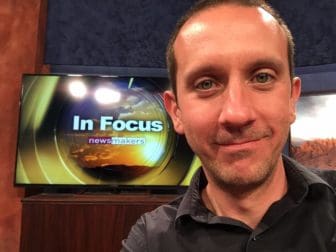COMMENTARY: The bright spot in the U.S. Supreme Court’s 2010 Citizens United decision was the upholding of transparency. The ruling opened the floodgates for the uber-wealthy to grab greater control of our local, state and national elections – but it also made clear that you have a right to know they’re doing it.

Heath Haussamen
Bringing political spending into the light “enables the electorate to make informed decisions and give proper weight to different speakers and messages,” the Citizens United decision states. In a ruling on another case that year, the late Justice Antonin Scalia wrote, “Requiring people to stand up in public for their political acts fosters civic courage, without which democracy is doomed.”
And yet, New Mexico has struggled for years to come up with laws or regulations to combat dark money. Parts of our Campaign Reporting Act were ruled unconstitutional years ago, and policymakers have failed to fix it.
The Legislature finally sent a bill to Gov. Susana Martinez this year that would have required independent groups that spend more than $1,000 during a campaign to disclose their funding. She vetoed it.
Now Secretary of State Maggie Toulouse Oliver is trying to enact a new rule to supplement the state’s reporting law. Groups that spend more than $1,000 in an election cycle would have to report all donors who gave more than $200.
Several right-leaning groups are fighting the proposal. Some left-leaning groups that have fought against or been lukewarm about increased disclosure in the past have been largely silent about the proposal from Toulouse Oliver, a Democrat.
Common Cause New Mexico, which voluntary discloses donor and spending information, has been lobbying hard for the secretary of state’s new rule.
Given that parts of the state’s reporting law are unconstitutional, the secretary of state is likely to rely on case law and enforce her proposal regardless of whether it’s enacted as a rule, an assistant attorney general said during a public hearing this week.
Toulouse Oliver’s proposal is an important step. I’d rather disclosure be protected in state law so it can’t be easily undone by a future secretary of state who doesn’t favor transparency. But a rule is better than nothing.
And it won’t solve the problem of dark money. It would require disclosure when spending is expressly related to a race or issue on the ballot. But it wouldn’t touch the massive spending by nonprofits on issue advocacy and criticism of government officials that shapes public opinion outside of an election season.
You should get to know, for example, who’s funding billboards and other media criticizing U.S. Rep. Steve Pearce, a Republican, that a coalition of left-leaning groups has spread across southern New Mexico. You should get to know when a wealthy individual from the left or right funds an attack on your public officials.
Dark money has spread like a cancer throughout our system. Those of us who engage in the public debate – politicians, candidates, nonprofit and other activist groups, journalists – should be transparent about how our work is funded. We should, in Scalia’s words, have the “civic courage” to stand up in public.
Courts have largely upheld donor privacy for spending that isn’t explicitly election-related, and that’s unfortunate. The degree of transparency I’m seeking may not ever happen.
But it’s needed to combat the United States’ oligarchical trajectory, to preserve our ability to participate in and influence the direction of our society.
Heath Haussamen is NMPolitics.net’s editor and publisher. Agree with his opinion? Disagree? We welcome your views. Learn about submitting your own commentary here.